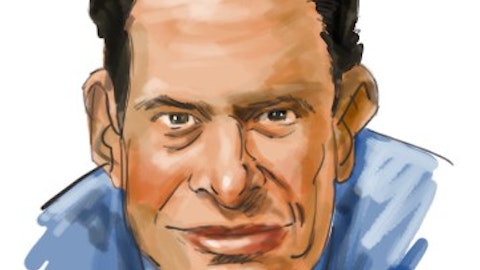
Invesco (NYSE: IVZ) is a global asset management firm with $672.8 billion of AUM as of March 31, 2012. It is among the most global and diversified asset managers out there that has allowed it to effectively scale products like the Invesco Balanced Risk Allocation strategy (ramped up from $5 billion of AUM to about $13 billion in two quarters). The company has reported five straight quarters of positive core business flows in a time when the industry is seeing outflows in actively managed US equities, and we expect that global equities and IBRA will contribute to continued inflows. We feel that management have been effectively managing its capital between investments in US distribution and branding as well as share repurchases/dividend increases—the recently announced annual dividend increase to $0.69 was substantial and generates a 3.2% yield for investors. And from a valuation standpoint, we think it’s very reasonable at 11.5x 2012 P/E.
LyondellBasel Industries (NYSE: LYB) is a global petrochemical company held by Jon Bauer, Christopher Pucillo, Mark McGoldrick, and Jamie Zimmerman. Our view on LYB is largely valuation driven. It trades at ~3.8x times 2013 EV/EBITDA yet has a ~16% 2013 projected FCF yield, and trades below replacement cost. The market is pricing LYB as though there will be a decline in industry profitability in the near-term when in fact, we think it is simply due to an inventory drawdown. We also identify a couple upcoming catalysts. LYB is set to be the next chemical company to become included in the S&P 500 index (timing unknown) and it has infrastructure in place for transport and fractionation of ethane to the gulf. We think ethane prices will move lower down to around $0.40 to $0.50 per gallon as bottleneck issues in fractionation capacity and logistics are solved.
Mastercard (NYSE: MA) With the General Court in Luxembourg ruling against MA’s challenge on an European Commission (EC) ban on cross-border interchange fees, we see more headline risk in MA than Visa. MA is appealing the decision, but either way we do not foresee a negative financial impact to MA since it isn’t a revenue source for the network models. Interchange refers to a fee that merchants pay to the card issuer whereas MA makes money from processing fees. This has been an ongoing back and forth with European regulators since 2007, when the EC felt that MA’s European cross-border interchange fees violated EU competition law. We continue to monitor the situation but are more focused on the merchant lawsuit.
Valeant Pharmaceuticals (NASDAQ: VRX) took a tumble in early May after Q1 results. However, we still think that VRX is among the best companies in the Specialty Pharmaceuticals (Spec Pharma) space. First off, VRX offers an 8% organic growth spec pharma platform, dramatically better than big pharma players and among the best in the spec pharma group. The company’s organic growth strength showed in its Q1 with its differentiated strategy delivering 11% y-o-y versus 4% for its peers, driven by US dermatology and emerging markets strength. We also view VRX’s diversification very favorably as a way to mitigate risk. About a third of VRX’s revenues come from emerging market countries and only half from the slower growing US market versus ~87% for its spec pharma comps. Additionally, no one product in its portfolio is more than 7% of its revenues. So in conclusion, VRX offers organic growth and diversification far exceeding that of its peers. It’s also cheap from on a relative valuation basis, trading at ~9.5x 2013 earnings versus its ~9.7x for its peers. And at ~9.5x, VRX trades below its historical 11.0x to 14.0x range.




